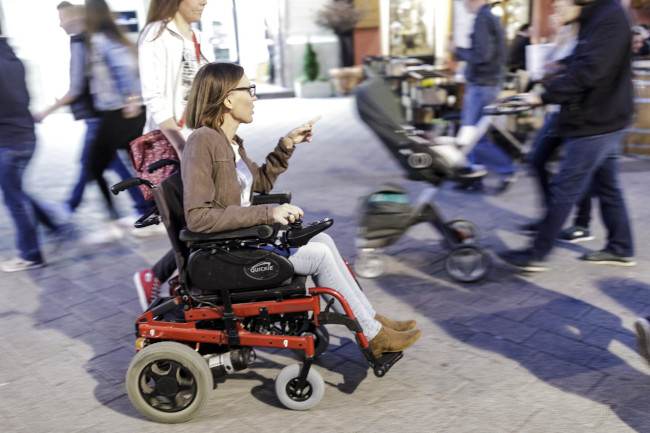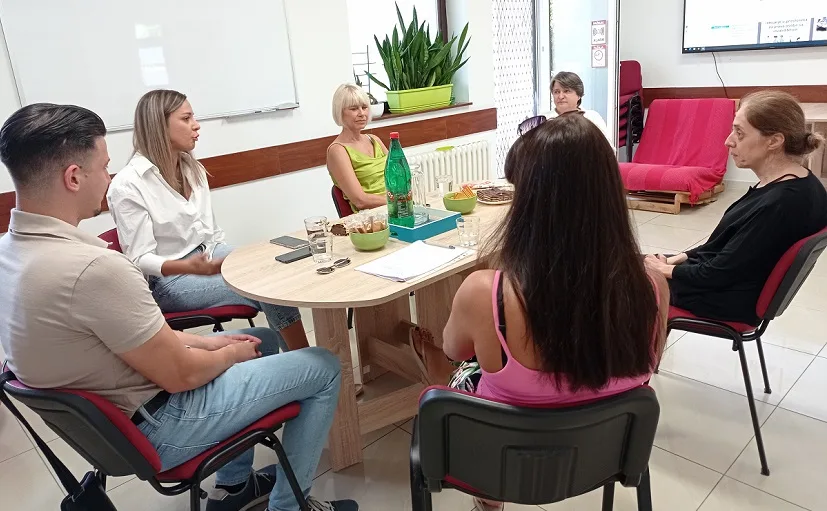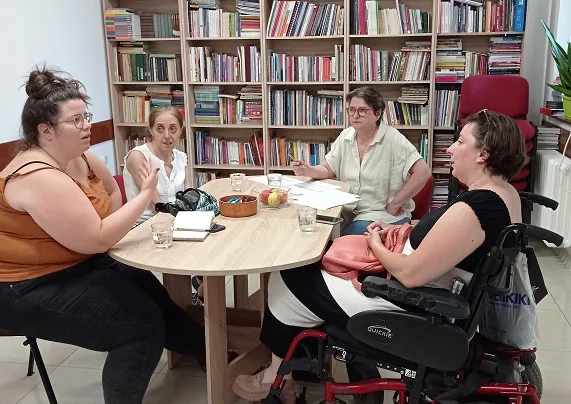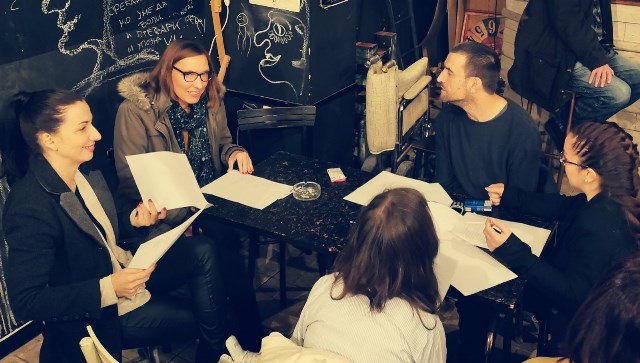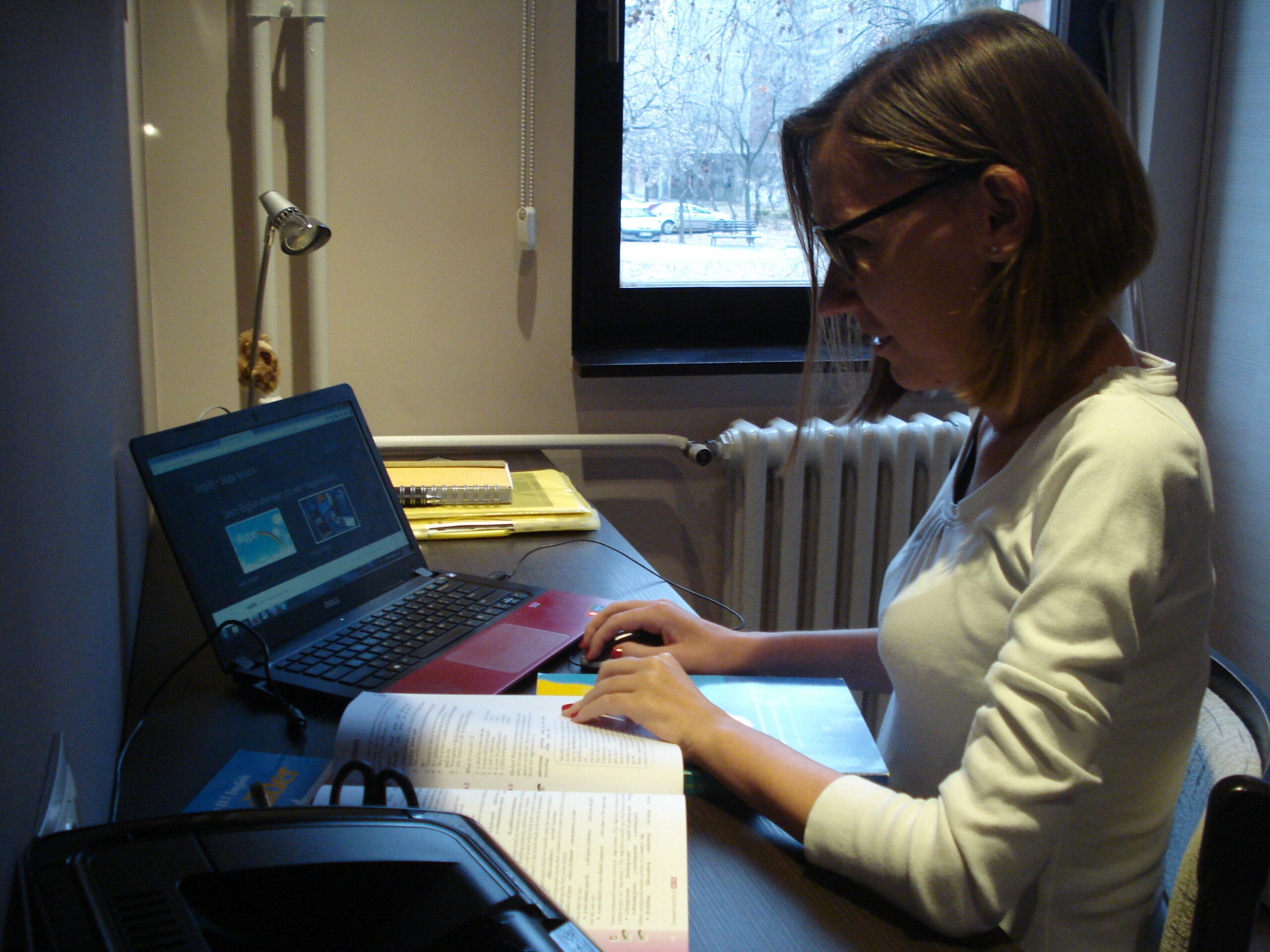Personal assistance is pivotal for the independent living of persons with disabilities. It is a support service for a person with a disability in performing everyday activities, adjusted to individual needs and the life situation of the beneficiary. A person with a disability chooses, employs, and trains a personal assistant and determines what kind of assistance they need, when, where, and how it will be provided. In its essence, through active support, personal assistance enables the exercise of fundamental human rights (the right to choose, freedom of movement, education, employment, work, etc.) and contributes to the social inclusion of persons with disabilities. What personal assistance looks like in real life, we learn from Dragana Marković, an English teacher, an activist for the rights of people with disabilities, and one of the coordinators of Translation’s Heart. Dragana has been using services of personal assistance for more than five years, during which she referred to at least fifteen persons in the role of the assistant. How much do we as a society comprehend the importance and meaning of this kind of service, how does the process of employing a personal assistant evolve, how demanding is it to find an appropriate person and establish suitable dynamics of the relationship, and are there potential risks, how should unexpected situations be resolved, and what is missing in order that personal assistance functions continually and steadily, we learn from Dragana’s to date experience.

Name the five most important facts about yourself.
DM: Say a lot with a few words. I like simplicity, although some say I am complicated. I am engaged in the job I trained for and love and in volunteer work that has brought me many new experiences and friendships. I always know what I don’t want. I like people, a particular sea, dark chocolate, and almonds.
Since when have you been a beneficiary of personal assistance?
DM: Since November 2015.
What are the most common misconceptions about personal assistance? Did you use to have dilemmas or doubts about that kind of service too?
DM: It appears that most people see a personal assistant as someone who picks up a person with a disability from bed in the morning, dresses them, and positions them in front of the window to look out the whole day doing nothing. This is a complete misunderstanding of the concept of personal assistance. A personal assistant is someone enabling another person to live independently, achieve their plans, goals, and ambitions, and carry out their daily activities. Another comment I often hear is: – It must be awful having someone in the house all the time. First of all, someone is not in your home all the time, but when their assistance is necessary to do a lot of things that, by the way, needn’t be house related. You are the one organizing your schedule and the time with an assistant accordingly. Secondly, without the assistance of that person in the house, you have no possibility to do many things, be it everyday chores or social and business activities, so an assistant is by no means a hindrance. They are present or not when needed, which is equally important. The third, and maybe the most common misconception, is that an assistant should take care of the beneficiary, nurse them, and have medical knowledge.
I don’t remember having uncertainties about the service. I couldn’t wait to start using it. At the time it became necessary when I had no solution to function without the service, there were problems with financing, so I had to wait. I think of it as the worst period in my life. As soon as I entered the process of acquiring assistance and choosing the right assistant, I realized that the independent living philosophy and the overall concept of personal assistance were following the unconscious principles and ways I wanted to live. I couldn’t articulate it clearly, but I knew from the first moment it was the right thing and it was feasible. Assistance is a great concept that, in the first place, gives you freedom and allows you to be who you are.
How does hiring the personal assistant go on in your case? Do you prefer male or female assistants, or it doesn’t matter? What skills and traits your assistant must have to do the job properly? How hard or easy is it to get to a person with suitable qualifications? Is there a type of person you wouldn’t hire in any case?
DM: When I interview a person for a job, sometimes I know in the first five seconds that I won’t hire them. I couldn’t say it is a specific profile of a person; it is simply a feeling, some energy they carry, which I don’t want in my vicinity. Furthermore, I don’t pick people who, at the first interview, say they will take care of me, look after me and make my life a fairy tale and great fun. People with such attitudes don’t understand the essence of personal assistance and have even less desire and capacity to grasp it. Finding a good assistant is not a simple task. Many things need to overlap. In my case, the person has to be physically fit because of the transfer. I try out that part during the first meeting. In addition, it is significant that the working hours suit the assistant, since it is not standard, and our personalities match each other. Sometimes we click in the first meeting, and I know it is right; other times, I need to meet with more candidates, weigh the pros and cons and choose. Things that might be an advantage, I emphasize again for assistants that I hire, are that they drive actively and live close by because on occasion they will need to come to work a few times a day. Explaining in detail to the assistant what is expected of them, what their job is, and what the schedule and working conditions are is significant. Equally, important is that the assistant declares if they are prepared to commit to something like that and if they see themselves in the job. Apart from that, there are no specific qualifications that are necessary. I have chosen female assistants hitherto because, among other things, I need assistance for dressing, transfer, and personal hygiene, so it’s only natural that it is a female. However, there are situations when it could be convenient to have both a male and a female assistant, on voyages, for example.
What chores does your assistant do? What does your ordinary day with personal assistance look like, and how would it look without one?
DM: Let’s say that my ordinary day is like a day of any person of my age with similar interests, who lives in the city, has no husband or children, and has a similar job. On the other hand, without a personal assistant, I wouldn’t have an ordinary day. I literary wouldn’t be able to get out of bed. With it, I can, again literary, do anything. It appears to me, and I dare say, the question of what an assistant practically do is quite impolite. It is between myself and my assistant, i.e. beneficiary and an assistant. An assistant is a kind of technical support, the right hand for all the things I would have done by myself. Speaking of myself, I need some help with everything I do, starting with life’s basics, mundane everyday things we all do without thinking (to describe it plastically, I need help with getting up from bed, dressing up, transfer, personal hygiene, food preparation, doing laundry, shopping, going for a walk, visiting a hairdresser). I also need assistance during various social and business activities – going to meetings, conferences, traveling, socializing with friends, goings out, trips, concerts, sports events, promotions, and exhibitions. I have to emphasize that an assistant’s job depends on the individual needs of each beneficiary and could vary a lot. Each assistant is referred to one beneficiary; any situation where an assistant works with more beneficiaries is not personal assistance. All persons operate in different ways. For example, two assistants working for two wheelchair users can have dissimilar chores, almost without common denominators.


How many assistants have you had so far? Can you remember who stayed the longest and who was the shortest in the role?
DM: I think that benefiting from personal assistance, so far, I’ve been referred to at least fifteen people. One of my current assistants, who has been with me from the very beginning, stayed the longest. The shortest term had a person that, I believe, needed any job really quickly. I was in a very critical situation at the time, and I actually chose the option among several that was less bad than others; it is no surprise that the assistant left her job very quickly, as soon as she had another opportunity.
Why do assistants leave posts, and what motivates them to do the job?
DM: Financial conditions used to be pretty unfavorable. The pay was low and a few months late. It was the most common reason for quitting the job. Nowadays, things are much better regarding those issues, and people stay longer in the role of an assistant. Still, the most common reason for leaving is finding another job. People either get a job in their line of work or other opportunities they want to take advantage of. The ones that work as assistants for a long time stay because they have a good relationship with a beneficiary; nobody mistreats or exploits them, which according to their statements, happens in the vast majority of cases nowadays. About the motives for choosing the job, we should ask them. It might be interesting to mention that one of my best assistants was the person whose brother registered her for the job. She knew almost nothing about assistance but was ready to exchange experiences, and we cooperated perfectly.
In which situations (potential or genuine) do you have no other option but to dismiss an assistant immediately?
DM: In the situations when an assistant doesn’t appear at work without previous notice or agreement or when they permanently miss the appointed time. Not showing up to work when you’re an assistant can’t be compared to not showing up to work in, say, a boutique or a shoe store that will just stay locked, and no harm done. If the assistant doesn’t show up for work, it might have grave consequences for the beneficiary. I had no such experience, but any kind of sexual harassment comes to mind as a reason for immediate dismissal.

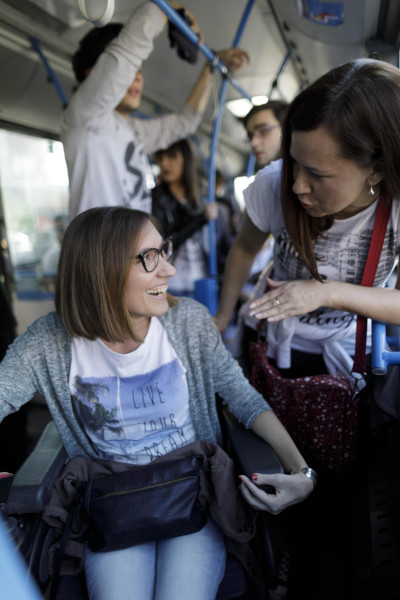
Are there clear boundaries in the relationship you establish with a personal assistant in terms of it being a business relationship that doesn’t evolve into friendship, romance, partnership, or other liaison? Or the boundaries are flexible, differing case by case? Have you experienced misapprehensions or instances when an assistant crosses the barrier or invades your personal space in a manner that doesn’t suit you? How do you resolve such issues?
DM: The relationship between an assistant and a beneficiary has to be predominately professional, but the human factor is inevitable in this job, which in time evolves into a kind of friendship. In the balance between ‘business’ and ‘friendship’, it is material that both the assistant and the beneficiary are aware, first of all of themselves, followed by the awareness of the role they play in that relationship. I always try to establish a partnership with an assistant with good communication and mutual respect as essential parts. The relationship is also very personal, particularly if you need assistance for a minimum of sixteen hours a day, as I do. The assistant is by your side in the most intimate moments of your life, and it is material they know how not to be a hindrance in those moments, not to be too dominant and intrusive, and yet not to behave as if they are not present at all. I usually established such relationships somewhat naturally, through a swap of life experiences, ways of functioning, and mutual acquainting. If it doesn’t happen naturally, if someone does something I am bothered with, what’s left is to deal with things by talking it over in a transparent and open manner from both sides. If nothing changes after a few talks, I am afraid the only solution is to replace an assistant.
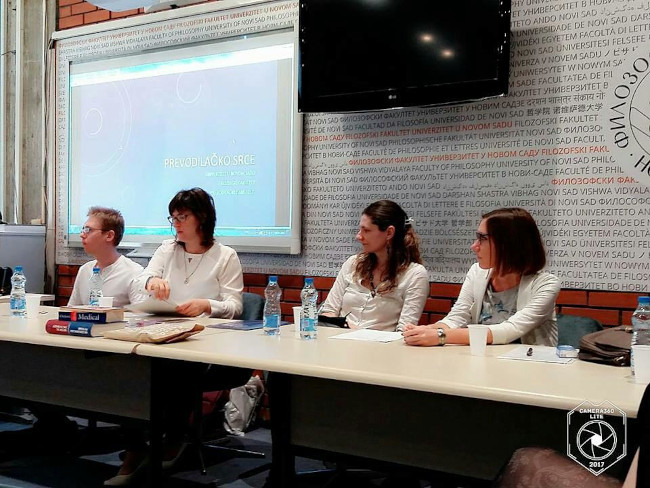

Have you ever felt unsafe and unsure, for any reason, with a newly employed assistant? Have there been any risky situations caused either by neglect or abuse of trust? How do you react to such occurrences, and what are your recommendations for preventing such cases?
DM: Considering transfer/lifting, I have never felt unsafe. I try out those points during the first interview and detect immediately who is holding me tight and who is faltering. I’ve always had faith during tryouts; in a way, it is natural that they won’t allow themselves to lift and drop me. On the other hand, if I trust them, they feel more confident. There was an assistant I didn’t want to take a drive. I cannot explain why exactly, but I didn’t believe her in that instance.
Once, an assistant notified me at midnight that she couldn’t come to work tomorrow morning because she felt ill. These are challenging situations. If an assistant doesn’t come to work in the morning, I won’t get up from bed, go to the toilet, eat, etc. Other daily duties might be postponed or rearranged, but not the three. Fortunately, the other assistant stepped in on that occasion. I phoned her that night, and she came to work in the morning, although it was her day off. On another occasion, an assistant came to work in the morning with a temperature of 39 ° C. She became ill during the night but knew the consequences if she didn’t come to work. As soon as I got up, I dealt with the problem and found a replacement, and the very same assistant stepped in. Assistants shouldn’t worry about the beneficiary, nor should they protect them. They need to be aware of how material and accountable their job is.
The most strenuous situation was when an assistant secretly packed her things and left me after a few days while traveling. We made arrangements before the trip, and they ceased to be valid all of a sudden from her side. We talked a few times, and instead of admitting that she couldn’t stay more and suggesting a replacement, she decided to pack her things in silence while I was in the bathroom and declared that she was going home. In situations like these, it is evident that a person is not only wrong for the job but there is no responsibility towards it and no human factor in the relationship between two people. Sometimes one cannot simply avoid some things. Over time, you learn how to choose assistants and take a stand so that such situations do not occur. The behavior of the assistant depends a great deal on the beneficiary. You are the one training them and getting them familiar with the whole concept of personal assistance.
How would you comment on the presentation of personal assistance in movies, for example, in The Intouchables? What corresponds to reality in these movies, what is valuable and adequate, and what is romanticized, stereotyped, insulting, or ableist?
DM: The Intouchables (French version) depicts various aspects of personal assistance in the best possible way. I always recommend everyone to watch it, both those who use assistance and assistants and people who have nothing to do with this story. The movie is significant, grand, amusing, and very useful. The same as personal assistance is actually swapping different life experiences. I first watched the movie long before I started using the service, and I remember thinking: -This is great – it’s a pity we don’t have it here? A few years later, I learned it exists and that everyone has the right to decide about their own life and choose how they would live, starting from little details to sizable issues.
Is there anything I haven’t asked you that is essential to add?
DM: Personal assistance is a service in the social welfare system and is potentially the right of every person. The right to this service and its financing should be fully in accordance with the International Convention on the Rights of Persons with Disabilities (our country is its signatory, act 19 and General Comment no.5 are about assistance). It would mean that anyone has a right to an appropriate scope of service (8, 16, or 24 hours a day) and that one beneficiary can employ more assistants. For example, I need assistance for a minimum of 16 hours a day, every day of the week, including weekends and holidays. One person cannot cover it, either due to physical reasons or because of the Labor Law. Our law predicts a minimal standard of 40 hours of personal assistance a week, and local communities do not finance additional service hours (although it is not stated that service providers cannot provide more than the minimal standard). It would mean in practice that I would have to go to bed at 4 p.m. when an assistant finishes work, stay in bed and wait until 8 a.m. the next morning when they start work again. Following that logic, I neither get up nor live on weekends and holidays. I am glad that Novi Sad has done a lot over the last two years, and now we are only a step away from an authentic and permanent solution, although there are yet issues that need to be aligned. It is equally material that assistants have good working conditions, i.e. that they are employed under the contract, have the right to sick leave, annual vacations, etc.
Photographs: Dragana Markovic’s personal archive
Translated by: Suzana Belos
